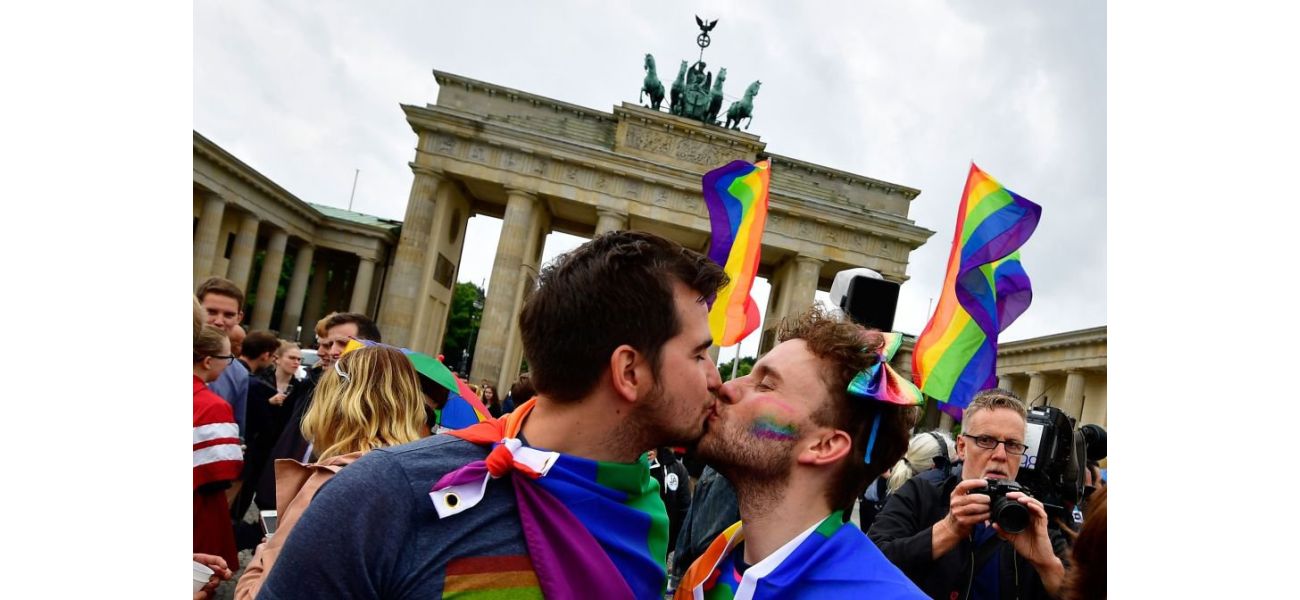Berlin's police chief says that LGBTQ+ individuals and Jews are not protected in the city.
November 19th 2024.

Berlin has been praised as a welcoming city for the LGBTQ+ community, but the reality is not so simple. According to the top police official, Barbara Slowik, there are parts of the city that may not be safe for openly LGBTQ+ people and Jews. Slowik clarified that there are no specific "no-go zones" in Berlin, but there are certain neighborhoods where queer and Jewish individuals may feel more at risk.
In an interview with the Berliner Zeitung newspaper, Slowik explained, "There are areas where I would advise people who wear a kippah or are openly homosexual or lesbian to be more cautious." She also emphasized that she did not want to label any particular group as perpetrators, but she did mention that there are neighborhoods with a high percentage of Arab residents where there is open support for terrorist organizations and blatant anti-Semitism.
Slowik wants to assure people that the number of violent crimes against Jewish individuals is fortunately low, although any crime is one too many. She understands that there may still be fear and concern, especially after the attack on Israel in 2023, which resulted in the deaths of over 1,100 people. Since then, the Berlin police have opened over 6,200 investigations into anti-Semitism. Most of these cases involve online messages or graffiti, but there have also been around 1,300 incidents of violence.
Slowik clarified that the majority of these violent incidents were not specifically targeted towards Jewish individuals, but rather occurred during protests against Israel's war in Gaza. However, there have been some concerning incidents, such as a Jewish youth football team being chased by a group of youths with weapons and another incident where a waiter at a restaurant was verbally and physically assaulted with homophobic insults.
Despite these alarming incidents, Germany has made progress in terms of LGBTQ+ rights and acceptance. This year, Germany was ranked as the 10th most LGBTQ+ friendly country in Europe by ILGA-Europe, moving up from 14th place the previous year. This is thanks to the country's strengthened anti-discrimination laws. However, there is still work to be done as MANEO, an anti-LGBTQ+ violence group, recorded over 1,000 hate crimes against the community in Berlin last year, a 29% increase from the previous year. Unfortunately, many hate crimes still go unreported.
MANEO believes that the rise in hate crimes may be linked to the increasing visibility of the LGBTQ+ community in Berlin, which is known for its diverse scene cultures. While this diversity is something to be celebrated, it also makes the community more vulnerable to attacks from those who oppose universal human rights, diversity, and tolerance. Germany has also seen a rise in far-right sentiment, which adds to the concerning situation.
One interesting aspect of Berlin's population is its Arab community, which has been growing since the 1960s when thousands of Moroccans were invited to help rebuild the country after the war. Today, over 182,000 people of Arab origin call Berlin home, with the district of Neukölln having the highest percentage. This district is also known for its thriving LGBTQ+ nightlife scene. However, despite the diversity in this community, there has been a worrying increase in Islamophobic hate crimes, which rose by 114% in 2023. Unfortunately, these incidents are often overlooked by the authorities.
Overall, while Berlin may be seen as a progressive and inclusive city, the reality is more complex. There are still areas where certain groups may feel unsafe, and hate crimes, especially towards the LGBTQ+ community, are on the rise. It is important for the authorities to address these issues and for the community to continue advocating for their rights and safety.
In an interview with the Berliner Zeitung newspaper, Slowik explained, "There are areas where I would advise people who wear a kippah or are openly homosexual or lesbian to be more cautious." She also emphasized that she did not want to label any particular group as perpetrators, but she did mention that there are neighborhoods with a high percentage of Arab residents where there is open support for terrorist organizations and blatant anti-Semitism.
Slowik wants to assure people that the number of violent crimes against Jewish individuals is fortunately low, although any crime is one too many. She understands that there may still be fear and concern, especially after the attack on Israel in 2023, which resulted in the deaths of over 1,100 people. Since then, the Berlin police have opened over 6,200 investigations into anti-Semitism. Most of these cases involve online messages or graffiti, but there have also been around 1,300 incidents of violence.
Slowik clarified that the majority of these violent incidents were not specifically targeted towards Jewish individuals, but rather occurred during protests against Israel's war in Gaza. However, there have been some concerning incidents, such as a Jewish youth football team being chased by a group of youths with weapons and another incident where a waiter at a restaurant was verbally and physically assaulted with homophobic insults.
Despite these alarming incidents, Germany has made progress in terms of LGBTQ+ rights and acceptance. This year, Germany was ranked as the 10th most LGBTQ+ friendly country in Europe by ILGA-Europe, moving up from 14th place the previous year. This is thanks to the country's strengthened anti-discrimination laws. However, there is still work to be done as MANEO, an anti-LGBTQ+ violence group, recorded over 1,000 hate crimes against the community in Berlin last year, a 29% increase from the previous year. Unfortunately, many hate crimes still go unreported.
MANEO believes that the rise in hate crimes may be linked to the increasing visibility of the LGBTQ+ community in Berlin, which is known for its diverse scene cultures. While this diversity is something to be celebrated, it also makes the community more vulnerable to attacks from those who oppose universal human rights, diversity, and tolerance. Germany has also seen a rise in far-right sentiment, which adds to the concerning situation.
One interesting aspect of Berlin's population is its Arab community, which has been growing since the 1960s when thousands of Moroccans were invited to help rebuild the country after the war. Today, over 182,000 people of Arab origin call Berlin home, with the district of Neukölln having the highest percentage. This district is also known for its thriving LGBTQ+ nightlife scene. However, despite the diversity in this community, there has been a worrying increase in Islamophobic hate crimes, which rose by 114% in 2023. Unfortunately, these incidents are often overlooked by the authorities.
Overall, while Berlin may be seen as a progressive and inclusive city, the reality is more complex. There are still areas where certain groups may feel unsafe, and hate crimes, especially towards the LGBTQ+ community, are on the rise. It is important for the authorities to address these issues and for the community to continue advocating for their rights and safety.
[This article has been trending online recently and has been generated with AI. Your feed is customized.]
[Generative AI is experimental.]
0
0
Submit Comment





